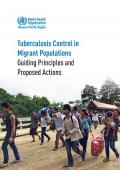Guidelines - Released in 2016
MDR-TB is essentially a human-made problem that develops because of low-quality drugs and/or inadequate treatment regimens, and it is difficult and expensive to treat. The development of migrant-sensitive TB control policies is especially critical given the high mobility of migrants—which increases the likelihood of transmission and treatment default, their lack of access to health-care services, their often dire living conditions and their propensity to inadequately self-treat in the private sector. In formulating such policies, however, policy-makers should note that TB is primarily transmitted within migrant communities, with very limited evidence of transmission from migrant groups into host country populations.
This consensus-based document offers a direction for countries to gradually move towards, subject to their existing national laws and regulations. It is the product of a regional consultation of health and immigration officials from 13 Western Pacific Member States conducted 26–27 March 2013 in Manila, 12 of which endorsed the document. One Member State, while recognizing the importance of addressing TB control in migrants, withheld its support until a broader regional consensus on migrant health is reached.
Downloads
Organizations
- World Health Organization (WHO)






